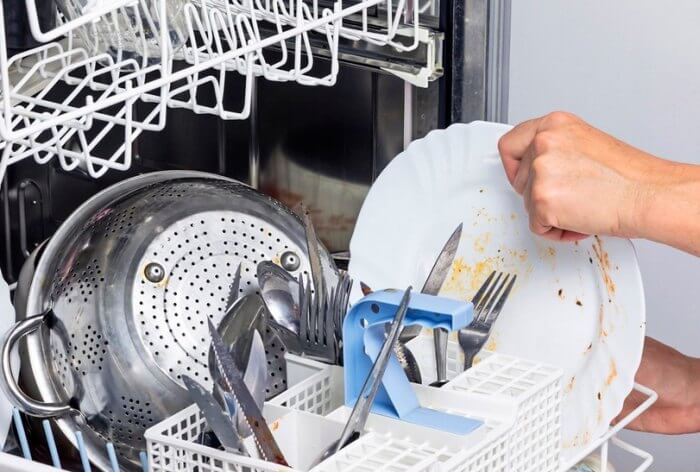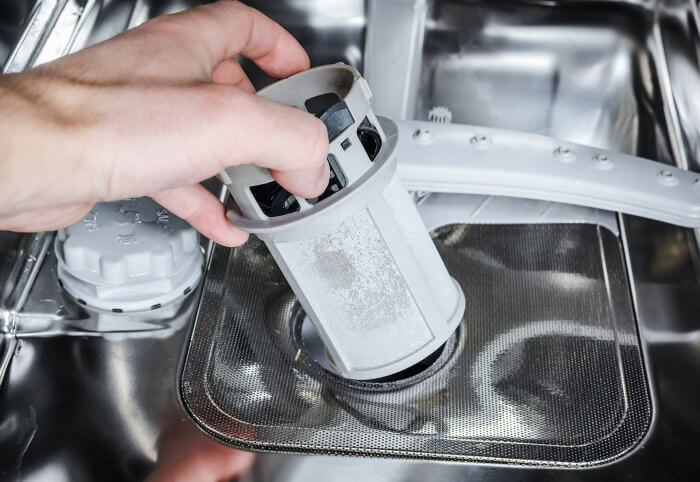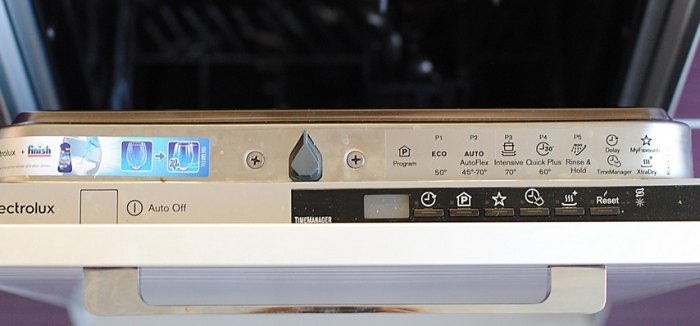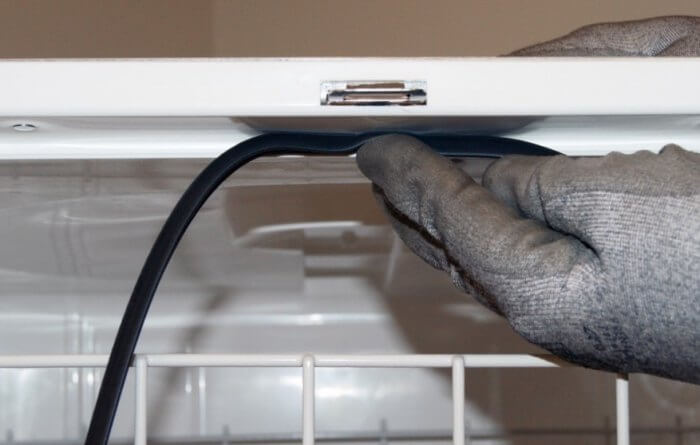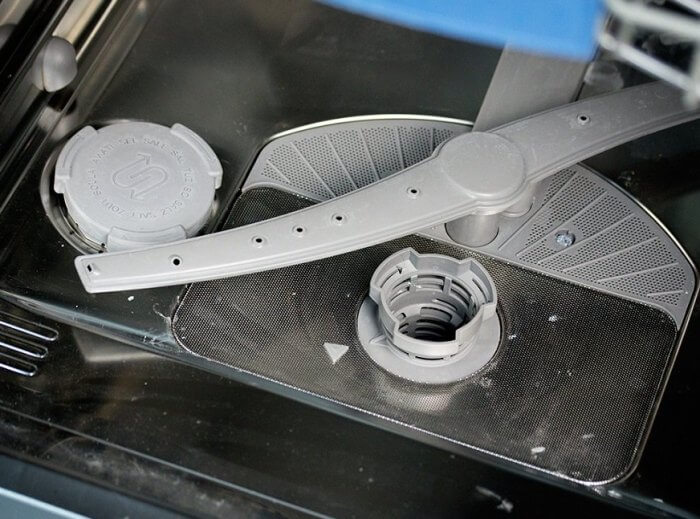The dishwasher has become one of the main assistants in the kitchen. The main advantages of dishwashers are saving time and effort, economical consumption of electricity and water, removing hard-to-reach stains and dried food from dishes.
It is always unpleasant if the equipment does not cope with its duties or breaks down, so let's figure out for what reasons the dishwasher can not cope well with its functions or even fail.
Causes of poor dishwasher performance
The main function of a dishwasher is to wash dishes efficiently. But sometimes, when we open the dishwasher, we see that several plates are left with the remnants of dried food or with a white coating. Such a problem may occur due to technical problems, or due to negligent operation. In the article we will tell you what this is connected with and how to solve this problem.
Misuse
- Remove leftover food from dishes before loading the dishwasher. Especially if you loaded the dishes in the morning, and turned on the mode only in the evening. Sometimes even soaking does not help - the remnants of food are firmly stuck. Information about this is in the instruction manual, the manufacturer warns that the dishes should be free of food residues.This threatens to clog the filters, and the dishwasher may break.
- Another common reason is wrong choice of washing mode. If you have heavily soiled dishes, then you need to choose a sink with a long cycle and a higher temperature. Fast or economy mode will not cope with difficult dirt.
- Sometimes the dishes are not washed due to improper loading.In the instruction manual there are diagrams for loading dishes into the hopper. If not loaded properly, the circulation of water inside the hopper may be disturbed. No need to reload the baskets, it is better to make a second load.
- Wrong choice of detergents. Do not save on detergents - buy tablets (powder or gel) for washing, conditioner and salt only from trusted manufacturers. Do not buy detergents that have passed their expiration date.
- Check filters. Remains of food that is not removed from the plates regularly settle and clog the filters. The instruction manual states that it is better to clean the filters after each cycle and prevent them from clogging.
- Incorrect equipment installation. Stop the dishwasher on a level surface. When installing check the level, and twist the legs.
Dishwasher breakdowns
It is much worse if the problem did not arise due to improper operation, but a more serious breakdown occurred:
- Scale or the appearance of limescale. Any technique that is associated with heating water is subject to scale over time. You can buy water softeners in stores, but they can not always cope with the problem. Worst of all, scale is formed inside the box and just looking into the dishwasher you will not see it.The only thing that will tell you that there is such a problem is the formation of scale on the sprinklers. An inexpensive, simple and effective folk method for descaling is to run the machine without dishes on a high temperature setting with the addition of citric acid. Household chemical stores sell descalers. It is recommended to clean the machine 1-2 times a year for prevention.
- Heating element failure. In most cases, the heating element becomes inoperative due to scale. In this case, the water simply will not heat up, and it will not work to wash the pollution with cold water. It is necessary to dismantle the dishwasher and replace the heating element with a new one.
- Breakdown of the circulation pump.With such a problem, the water supply for washing dishes is blocked. Requires disassembly and replacement.
- Malfunction of the control module. The control module receives and distributes tasks when the dishwasher is running. If a failure occurs, then the module must be dismantled and re-flashed.
- Leak.
Exists several reasons for the formation of a leak:
- Seals broken. If the seals have been damaged - dried out or torn, then this can cause leakage.
- Broken door lock. When the lock breaks, the dishwasher door does not close tightly and an error code is usually displayed on the control module. To eliminate this error, it is necessary to remove the facade, control panel, unscrew the lock and replace it with a new one.
- Deformation of the door or fastening - diagnostics are carried out and the cause of the deformation is clarified, if necessary, the necessary part is changed. Such a breakdown requires dismantling the door and replacing the part.
More reasons:
- The dishwasher door does not close.Usually, problems with the dishwasher in most cases are associated with improper operation. You can solve such a number of problems yourself. However, in some cases, a malfunction can only be solved by specialists.
- Breakage of the sprinkler impeller. Element of the mechanism due to which the sprinkler rotates. In this case, diagnostics and replacement of the part are necessary.
- Out of order turbidity sensor. This feature is available in expensive models of dishwashers. The sensor determines the degree of contamination of the water and starts an additional rinse cycle. If the sensitivity of the sensor decreases, then the quality of the wash is lower.
Remains of plaque on the dishes
If after the washing cycle you took out the dishes, and there is a white coating on it, do not rush to panic and call a specialist. The following factors can cause such a raid:
- You have adjusted the water hardness incorrectly.The instruction manual states that before the first use, you need to adjust the water hardness level. Some manufacturers, when buying a dishwasher, put specially designed test strips in the kit to check the level of hardness.
- White coating on the dishes may appear due to salt getting into the hopper. This could happen if you topped up the salt and accidentally spilled it, or the salt compartment lid was not closed tightly. Manufacturers recommend that after loading the salt, wipe the hopper and make sure that the salt has not been spilled. It is also recommended to add salt just before the start of the cycle.
- Incorrect selection or dosage of detergents. Use products from reputable manufacturers.
It is also necessary to pay attention to technical errorsthat are displayed on the control panel.Each manufacturer has its own codes and decodings, they are usually prescribed in the instruction manual.
Always check for illuminated lights on the control panel that indicate that there is no salt or rinse aid in the tanks.
To extend the life of the dishwasher, follow the rules of operation. Carry out regular preventive cleaning of the dishwasher. If you are faced with poor-quality work of the dishwasher, then first check the detergents you use, their dosage, clean the filters. If you understand that the breakdown is not related to improper operation, then it is better to call a specialist who will diagnose, identify and eliminate the cause of the breakdown.

